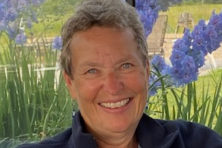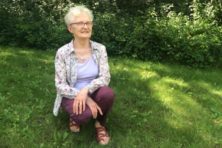Peninsula Poetry: Peter Sherrill
- Share
- Tweet
- Pin
- Share
compiled by the DOOR COUNTY POETS COLLECTIVE
Peter Sherrill has lived in Door County since the late eighties. He’s published work in a variety of state and national journals and earned honors that include the Wisconsin Regional Writers’ Jade Ring for Poetry and the Wisconsin Fellowship of Poets’ Muse Prize for Excellence in Poetry. Sherrill has been a part of several writers’ groups, including Sheets, which claims two of Wisconsin’s poets laureate among its members.

What’s your writing routine?
I seem to write in two modes: “back-burner” and “afterburner.” Sometimes a piece will rummage around in the back of my mind for months, maybe years. In that mode, there’s often an extensive stretch of edits and revisions. Other times, a piece comes to me almost fully formed, and I have to hammer it out really fast before the words escape me. Those pieces usually need only light editing, such as typos and punctuation.
What do most poorly written poems have in common?
First, the poet’s inability to trust the reader: The poet dwells on the obvious. Second, slavish devotion to a form such as sonnet or sestina, which results in mangled syntax and anguished rhymes. That detracts from the arc of the poem. Hint: If you have to go through that kind of contortion, you’re using the wrong form.
What do most well-written poems have in common?
I’m going to paraphrase the late James Baldwin, who said that a poem has four parts of roughly equal importance: the title, the first line, the last line and the rest of the poem. If the poem invites you in, seats you comfortably, nourishes you and then shows you gently to the door again – that’s a winner.
Is it important to understand the meaning of the poem, or for the reader to be able to “solve” it?
No, but a well-written poem should let the reader find some meaning, whether it’s what the poet intended or not. I find W.S. Merwin’s poetry maddeningly difficult – but sometimes I’ll come back to a poem of his I’ve hated forever, and reread it and think, “Oh … OK … yeah,” and I may not “get” the poem, but I come to peace with it. For me, that may be all the meaning I need. Some meditative forms, such as haiku, are really invitations to the reader to make their own meaning.
What book are you reading right now?
Actually, it’s an instruction manual on how to assemble and wire up an electric guitar kit I bought. Recent books include Becoming by Michelle Obama and A Spark of Light by Jodi Picoult. Current poetry anthology is Catalog of Unabashed Gratitude by Ross Gay.
“Gus Ain’t Here”
Gus ain’t here. The station’s long since closed. Not a bit
of gas been through those pumps for nigh-on twenty years.
I saw him, though – wasn’t quite two weeks ago – a kid
was tightening lugnuts on a compact spare, and there’s
that Klenke smile and nod. And then the hands wiped on the leg.
And then the right hand raised to say “no, thanks” and Gus’
goodbye wave. A lady in a business suit waves back, and heads
on down the road. Her smile says she’s got it. You can trust
that next time someone needs some help, she’ll be there. And that’s
how Gus would want it. He always said a neighbor’s anyone
who needs a hand – and he was quick to give it. His hand
was always open; and his best pay, seein’ someone pass it on.
“The Laws of Gravity and Motion”
I suppose that some time soon the planets, moons and stars
will get back to their polonaise of pull, and twirl and orbit
And maybe then they’ll move again like fond familiar lovers
if you pause from what you’re doing and let them go back to it
but I’d rather that you didn’t. I don’t think they’d mind much
if we kept them waiting, you with your book and I with my head here
in your lap, your thumb and finger idly orbiting my earlobe. You’ve just
rubbed out all the laws of gravity and motion. I’m drifting near
some nebula; there’s stars and planets whirling like a ballroom mirror
suns and moons set free to wander. Math and physics? Just some
vague abstraction. All my universe is rolling over
one ecstatic thumb and fingertip. Let them run
loose a little longer. There’s nowhere that they need to be.
You’re lost in your book. I’m lost in your lap. It’s heavenly.
Peninsula Poetry is a monthly column curated by the Door County Poets Collective, a 12-member working group that was formed to publish Soundings: Door County in Poetry (Caravaggio Press, 2015) and continues to meet.


